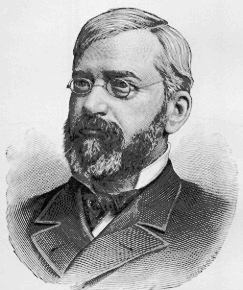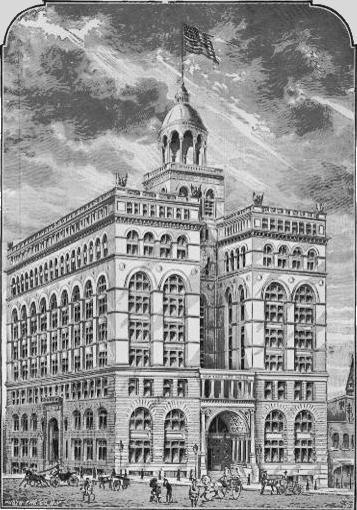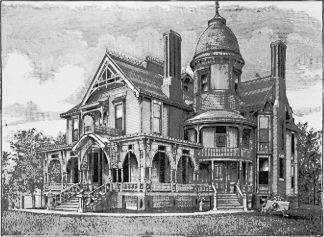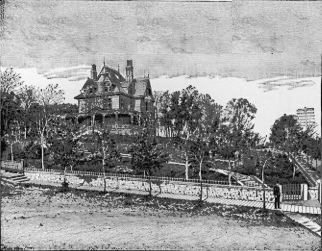|
OMAHA
ILLUSTRATED.
The first legal entry of land made in
Nebraska was in March, 1857. The first public sale of
Government lands to the highest bidder was made on the 5th
of July, 1859. Colonel A. R. Gilmore was the first Receiver
of the United States Land Office at Omaha, and Colonel John
A. Parker was the first Register. The land covered by the
site of Omaha was granted in two patents -- one to John
McCormick, May 1, 1860, the land having been bid off by him
at the public sale of July 5, 1859, acting as trustee, and
the other to Jesse Lowe, Mayor, October 1, 1860, on the
entry made March 17, 1857.
|
[In his chosen
profession of the law the Hon. James M. Woolworth
has reached the first rank. In public and private
life he is one of Omaha's foremost citizens. He was
born in Onondaga Valley, Onondaga county, N. Y., in
1829. The finishing touches to his education were
received at the well known Hamilton College, from
which he graduated in 1849 with high honors. He
adopted the profession of the law and was admitted
to the bar in his native State in 1854, and
practiced before the courts of Syracuse until
October,
|
|
1856, when he followed the example of so many
bright young men at that time. He migrated West and
arrived in Omaha October 31, of that year. At the
time Judge Woolworth came to Omaha the bar of this
city, although limited, was composed of bright
young lawyers, most of whom have risen to
prominence in the city. His abilities were soon
recognized and he was elected the first City
Attorney of Omaha. He also served the city in the
Legislature in the early period and was chosen as a
delegate to the Constitutional Convention of 1871.
Two years later he headed the Democratic State
ticket for the high office of Chief Justice of the
Supreme Court and polled the full party strength.
Never desiring office, he has been called to it a
number of times by the citizens irrespective of
party. Mr. Woolworth has been closely identified
with the growth and progress of the city. In his
private life he has taken a deep interest in
|

HON. JAMES M. WOOLWORTH.
|
educational and religious matters, and stands as
a bulwark in the affairs of the Episcopal church of
this city. For more than a quarter of a century he
has been a vestryman of Trinity Cathedral and for
seventeen years its senior warden, from which
position he resigned. To him, more than any other
person, is the meed of praise due for the present
prosperous condition of the church, and its place
of worship was built by means of his generosity. He
is at present Chancellor of the Diocese of
Nebraska, and for more than twenty years one of its
lay delegates to the general convention of the
church. He is also a member of the committee on the
revision of liturgy, and a trustee of Racine
College, in Wisconsin, and Brownell Hall, in Omaha.
He received the degree of LL. D. from the latter
college in 1875. The Omaha public school system has
been nurtured and encouraged by Mr. Woolworth, and
he was a member of the first board of regents for
the
|
|
High School in 1867. Mr. Woolworth has amassed a
fine competency in the practice of his profession,
and lives in one of the most handsome residences in
Omaha. He enjoys the largest legal business in the
city, his cases being confined to the most
important civil suits that come up in the courts.
In the development of Omaha, Judge Woolworth has
been very active. He is a large investor in
business property and real estate, and one of the
projectors of the Union Stock Yards Company, an
institution that has accomplished so much for
Omaha. He was one of the original trustees of the
South Omaha Land Syndicate, and is director of the
South Omaha Land Company, and counsel of that
company and of the Stock Yards Company. He is also
one of the directory of the First National Bank,
the strongest financial institution in the city.
Judge Woolworth enjoys the reputation of being a
large-hearted, high-minded, Christian gentleman, of
deep learning and profound knowledge of the
law.]
|
In the early days of Omaha,
justice was frequently administered in a very summary way
and without due process of law. Horse thieves especially
received no mercy. In the summer of 1856, two thieves stole
some horses from the settlers in the vicinity of Omaha, and
sold them to a band of Pawnee Indians, from whom the animals
were recovered. The thieves were captured and brought into
the city. They were stripped to the waist and tied to a
liberty pole on Harney street, where they were given
thirty-nine lashes each upon the back with a rawhide. The
whipping was done alternately by the owners of the horses
and the Indians who had bought them and had to give them up.
An effort was made by Chief Justice
[38]
|



